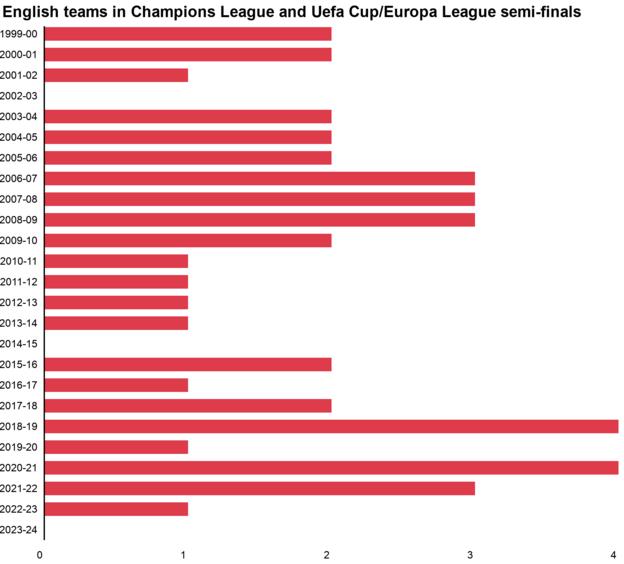For only the third time in the 21st century, England has no teams in the semi-finals of the Champions League or Europa League – so what has gone wrong?
Manchester City and Arsenal both exited the Champions League quarter-finals on Wednesday, going out to Real Madrid and Bayern Munich respectively.
And on Thursday, as expected, Liverpool and West Ham crashed out of the Europa League – after failing to overturn first-leg deficits against Atalanta and Bayer Leverkusen.
The only English team left in Europe are Aston Villa, who beat Lille on penalties to reach the semi-finals of the Europa Conference League, the third-tier tournament that is only in its third season.
How rare is this?

In 1999 the Cup Winners’ Cup was scrapped and the Uefa Cup – now called the Europa League – moved up from being the third-tier to the second-tier European trophy.
This is only the third time since then that England has had no teams in the last four of that competition or the Champions League – alongside 2002-03 and 2014-15.
And it will be only the fourth time in the past 20 seasons that the Premier League will not have a finalist in either competition.
Five years ago both finals were all-English affairs, with Liverpool beating Tottenham in the Champions League final and Chelsea seeing off Arsenal to win the Europa League.
Three of the past five European champions have been English, with Chelsea beating Manchester City in 2021 and City beating Inter Milan last season.
This lack of semi-finalists in the top two trophies comes as a surprise as England’s four quarter-final representatives matched their average over the past six seasons.
The Champions League semi-finals see Paris St-Germain face Borussia Dortmund and Bayern Munich take on Real Madrid. In the Europa League it is Atalanta v Marseille and Roma v Bayer Leverkusen.
Perhaps extra frustrating for English clubs and their fans is the location of the finals – with Wembley hosting the Champions League final and Dublin’s Aviva Stadium the venue for the Europa League showpiece.
Why is this such a shock?
The Premier League, with its teams backed by billions of pounds, have become stronger and stronger over recent years – to the stage where it would be hard to question it being the best league in the world.
Ten of the 12 biggest transfer fees spent by European clubs since 2020 have been English sides – with England duo Jude Bellingham and Harry Kane the other two.
Thirteen of the top 20 teams with the highest net spend (transfer money spent minus transfer money received) over the past decade are English, with teams like Crystal Palace and Bournemouth outspending Champions League semi-finalists Bayern Munich and Real Madrid.
| Highest net spending (2014-2023) | |
|---|---|
| 1. Manchester United – £1,196.6m | 11. Aston Villa – £414.3m |
| 2. Chelsea – £885.5m | 12. Liverpool – £395.3m |
| 3. Paris St-Germain – £865.8m | 13. Al-Hilal – £391.3m |
| 4. Arsenal – £746.9m | 14. Juventus – £385m |
| 5. Manchester City – £733.8m | 15. Everton – £336.1m |
| 6. Newcastle United – £575.2m | 16. Crystal Palace – £322.3m |
| 7. Barcelona – £568.4m | 17. Bournemouth – £294.9m |
| 8. Tottenham – £522.1m | 18. Bayern Munich – £294.1m |
| 9. AC Milan – £467.3m | 19. Real Madrid – £277.6m |
| 10. West Ham – £451.9m | 20. Nottingham Forest – £265.8m |
| Stats from CIES Football Observatory Monthly Report | |
Why has this happened?
One argument is that profit and sustainability rules are holding back English sides.
At present, clubs cannot report losses of more than £105m over a three-year period – meaning clubs such as Newcastle, who were in the Champions League this season, cannot spend the money they have.
Everton and Nottingham Forest have both been deducted points for breaching the rules.
Speaking after Wednesday’s Champions League games, BBC football correspondent John Murray said: “They [Premier League teams] have become the traditional powerbase so this is a shock to the system.
“We’ve been hearing for years that part of the reason we have profit and sustainability and financial fair play is because of the power of so many Premier League teams. They have attempted to clip their wings. Has that played a part this season and meaning they’re not as strong as they might have been? Probably.”
Spanish football journalist Guillem Balague said it is too early to read anything into this.
“The teams are tired or not sharp at this stage of the season,” he said. “The Premier League is so demanding. To come up with a conclusion give me five years. This could be a consequence of a bunch of things.
“If it happens for five years maybe there’s a problem somewhere. I don’t think you’ll get that. I think you’ll get the dominance of English teams that we’ve already seen will continue next season. This is an accident I think.”
Hey, what about Villa? They’re still in Europe
England do have one semi-finalist in Aston Vila but because the Europa Conference League is pretty new, only in its third season, there is not scope to compare it to previous seasons.
Also it lacks the same kudos. The third-tier tournament was partially invented so clubs from smaller countries had a chance to get past qualifying.
In its three seasons, Armenia, Estonia, Gibraltar, Kosovo, Liechtenstein, Lithuania, Iceland, Faroe Islands and Bosnia-Herzegovina have all had clubs in a group stage for the first time.
England has had a Europa Conference League semi-finalist in each of the three seasons, with Leicester, West Ham – who won it last season – and now Villa.
Villa face Olympiakos, with Fiorentina playing Club Bruges in the other semi-final for a place in Athens.
Any other ramifications?
England teams crashing out of Europe left, right and centre has probably cost the Premier League a fifth Champions League spot.
The two countries’ teams who perform best this year in Europe’s three tournaments get an extra spot in next season’s Champions League.
In six of the past seven seasons, England would have got one of those spots.
Italy has sealed one and Germany is likely to get the other. England’s only hope is for Aston Villa to win both legs of their semi-final, plus the final, and for Bayern Munich, Borussia Dortmund and Bayer Leverkusen all to lose both legs of their semis.
At the start of the quarter-finals Opta said it was 82.5% likely the Premier League would have that fifth spot. It dropped to 57.8% after the first legs. After the Champions League ties it was down to 6.2%.

